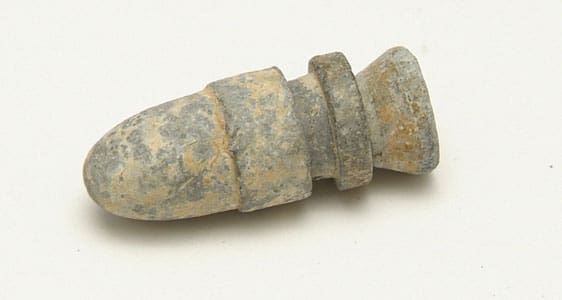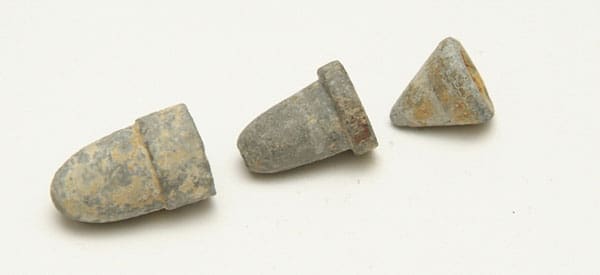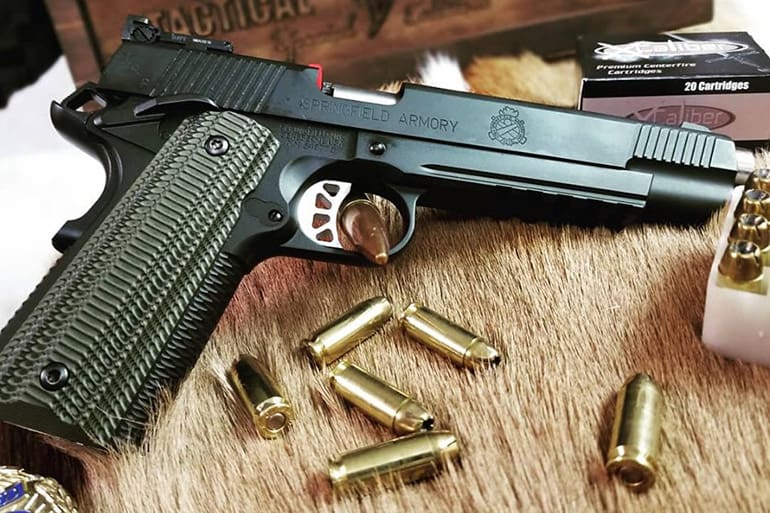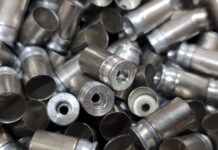Just as we continue to try to perfect projectiles in the 21st century, the same was true back in the 19th century.
Buck-and-ball fired from a shotgun allowed the shooter to have multiple projectiles per shot at their disposal. In theory, this improved the likelihood of hitting your target, but it wasn’t always the case since the projectiles were fired from a smoothbore barrel that did nothing to keep a tight pattern.
Rifled muskets combined long barrels with rifling to produce a very accurate weapon. The likelihood of hitting your target with a .58-caliber (or larger) projectile fired from your Civil War-era weapon was much greater than that of the smoothbore muskets in the previous eras.
Despite the guns being more accurate, they were still cumbersome and time-consuming to reload. Consequently, a man’s effectiveness could only be measured by how fast he was able to reload. If someone could find a way to fire multiple well-aimed projectiles from each discharge of the weapon, then you could increase the effectiveness of each soldier.
Enter Ira and Reuben Shaler of New York and Connecticut, respectively. On August 12, 1862, they received a patent for an “Improvement in Compound Bullet in Small Arms.”

Their improvement called for a projectile “made up in two or more parts, which fit the bore of the barrel, and so constructed that the forward end of each of the parts in rear of the front one enters a cavity in the breech of the one forward of it, and is so formed in relation to it that it separates from it after leaving the barrel of the gun, and makes a slight deviation in its line of flight from that pursued by its predecessor, as hereinafter more fully set forth. Three is, perhaps, the most proper number of parts.”
Basically, what they had designed was a nesting-doll of sorts, except with bullets. The idea is that the different parts of the bullet would separate from one another (but only slightly) after having been fired, enabling one shooter to hit up to three targets.
Their patent mentions that they wanted to create a projectile that would “embody and realize the advantages of the wellknown [sic] ball and buckshot of the smooth-bore arm, without the disadvantages of wildness of direction, shortness of flight, and intensity of recoil…”
Even though it seemed like a good idea at the time, history has gone on to show us that their Shaler bullet wasn’t well-received. Some of this can be credited to their design itself; more can be credited to the timing of their design in relation to the creation of repeating rifles – something Ira and Reuben cannot be blamed for, since they couldn’t foretell the future.
While examples have been dug up on a variety of Civil War battlefields, the Shaler bullet was never standard issue for soldiers. Their design goes down in history as being just one of the many attempts to build a better bullet in the 19th century.
Logan Metesh is a firearms historian and consultant who runs High Caliber History LLC.





And now manufacturers make hollow points that expand beautifully in 10% ballistic gelatin on YouTube videos.
(In people, not so much. Sorry, suckers.)
I blame Hillary.
I suppose the Shaler bullet was an attempt to hit 3 birds with one stone, bullet.
Timing is everything for product success.
August of 1862? Both the Henry repeater and the Spencer repeater were a reality at that point. Breech loading, self contained cartridges that fed from a magazine. Smith and Wesson also had a breech loading revolver using self contained cartridges. And then throw in all the single shot breech loaders that were coming on line and I suspect these two inventers were just willfully ignorant of the progress being made.
Well, it’s not even as if the development of cartridge firearms killed this concept per se.
A large portion of the U.S. Army-funded Project SALVO in the 1950s was all about experimenting with duplex and triplex loadings for both rifles and pistols, to try and increase hit probabilities. And Colt’s entry to the 1980s ACR program (one of the earlier attempts to replace/improve the M16) likewise used a two-bullet duplex round.
But the Camp Perry crowd said “how do you score it”?
The first three round burst.
the quest
to find a better bullet
stopped
with the 6.5
I can’t wait till bullets and powder are of the past and we get laser plasma ray launchers
That being said I remember the military looking at something like this design but in a two part bullet I in the 90s I think it was. Memory is a little fuzzy on dates but I remember it.
I’m not sure we’re going to see significant energy weapon development anytime soon. I used to think we were on the cusp of a lot of that stuff seeing the laser weapons mounted on planes and ships, however after doing a deep dive into those systems, those seem to be more propaganda weapons then anything.
Lasers are severely hampered by the atmosphere. Humidity, clouds, even just the air, absorb a lot of the heat. That coupled with the energy storage issues, it takes immense amounts of energy to make a laser an effective weapon. Projectile/explosive weaponry is likely here to stay for a very long time.
Lasers may make some serious headway in space however, as obviously there is no atmosphere in space and distances to your target will likely be quite immense.
Solar panels and storage batteries that actually work significantly better than those of Tom Edison first. What the lefty loons running the country now most fervently lust for.
“I can’t wait till bullets and powder are of the past and we get laser plasma ray launchers”
Yeah, until that day you press the button and are left standing there like a dumbass with a dead battery.
But I’m sure your attacker will be happy to let you charge up before he splits your skull open with a club… 🙁
I used to joke to fellow scifi fans about how many places had some anomaly, material, creature, or device that rendered energy weapons useless. Why I would stick to slug-throwers.
Yes SC cause slug throwers work in all environments and atmospheres
Good thing water is so small an area on earth 🌍
Dream a little
Awww ya can’t even dream about having a zorchiton ray gun so sad
I believe the military project I’m referring to in the 90s mighta been a leftover from project salvo which is along the same concept as this article.
I appreciate those who get outside the box and try new things and while some may work better than others they certainly aren’t failures because of the knowledge they gave us for future testing
The pursuit of a better bullet is still one being hard fought for today
https://en.wikipedia.org/wiki/Advanced_Combat_Rifle
It was duplex rounds.
This idea has not died. There are, currently, multi-part bullet designs on the market (albeit a small market) and similar concepts have been proposed and undergone military trials during the last half century. A two or three or four part rifle bullet, in concept, provides the same potential as a really tight shotgun choke. In practice, not so much.
Another old idea that keeps periodically resurfacing.
It could have applications in the shotgun slug market…
Such designs seem hampered by an incomplete gas seal behind the projectile. It’s why shotshells have wads. And a projectile pushed by another projectile is almost doomed to be more erratic in flight that one pushed directly by the powder burn.
I see the Second Amendment supporters here at TTAG are once again defecating on the First. Dare to submit an obscenity free comment that conflicts with the official party line on holler points and you get deleted. Hilarious.
What’s more hilarious is you thinking we give a shit what you think, Antifa-Fuckwit boy.
Just *one* of our 17 year-old boys put 2 of your ‘soldiers’ in a grave and the other one gets to jerk off with his other hand, because his arm is as limp as your Leftist Scum ™ dick… 🙂
So horrific that they didn’t delete this comment, which describes what you say is forbidden.
Keep up the great work, Socrates Jr.
@red wolf
TTAG doesn’t do that. Its a word press thing over which ttag has no control.
I believe the 1st amendment applies to what the GOVERNMENT can’t do, not what individuals or companies can’t do.
I blame Wayne Lapierre
Here, the multiple-projectile rifle cartridge is used to achieve adequate weight to cycle the action in a subsonic .308 round, but without exceeding the length of projectile that can be stabilized in a common .308 barrel.
http://www.davidtubb.com/precisionammo-308-2Holeammo
2A WIN: Court Declares NJ Gun Law UNCONSTITUTIONAL and will make NJ PAY ATTORNEY FEES > https://www.youtube.com/watch?v=zvLQPS_f9k8
A Federal Court signed a Consent Order and Final Judgment declaring NJ’s “justifiable need” standard to be unconstitutional under NYSRPA v. Bruen and announcing that gun rights plaintiffs that sued were “prevailing parties” under 42 USC 1988.
court order > https://storage.courtlistener.com/recap/gov.uscourts.njd.452993/gov.uscourts.njd.452993.51.0.pdf
Short and sweet, with no linguistic or legalistic acrobatics. That was a refreshing read. Carry on, Mr. Mazahreh et al.!
Making them pay those attorney fees is a real good thing
Comments are closed.